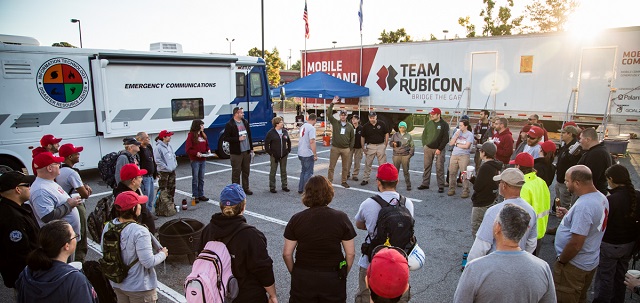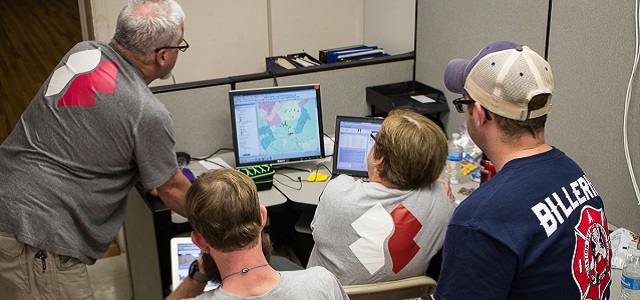Left: Todd Adrian, Jon Connors, Ford Sypher, Chloe Demrovsky, AnneMarie Staley
We are pleased to announce that the DRI Foundation has made a $5,000 donation to Team Rubicon to support their disaster relief efforts locally and abroad.
Foundation Chair AnneMarie Staley and Marketing Chair Chloe Demrovsky presented the check to Team Rubicon USA Major Gifts Officer Ford Sypher; Jonathan Connors, regional administrator, region 2; and Todd Adrian, regional engagement manager, region 2.
Team Rubicon is an international non-profit disaster response organization that unites the skills and experiences of military veterans with first responders to rapidly deploy disaster response teams to communities affected by disasters across the country. Team Rubicon currently maintains a roster of over 25,000 volunteers able to deploy throughout the United States.
Team Rubicon recently deployed volunteers to respond to the earthquakes in Nepal among other disasters local and international which is what identified them as candidates for the grant.
“The Foundation was looking to diversify its grant recipients to ensure we were providing support to a variety of organizations. Additionally in this case, those that were directly making a lasting impact in Nepal,” said DRI Foundation Giving Committee Chair Jerry Vevon.
“As a veteran of 22 years in the U.S. Army and vice chair of the committee, we were impressed that Team Rubicon brings together the skills and experiences of military veterans with first responders to rapidly deploy emergency response teams. Their operational principles are directly in line with the intent of the Disaster Recovery International Foundation. And as an international non-profit organization, their reach extends world-wide similar to the DRI Foundation.”

Nepal. Team Rubicon member Sarah Terez Malka takes a well kept brick to be used for later in a rebuild.
Team Rubicon and DRI Foundation representatives discussed the synergies between the two organizations. “A lot of DRI Certified Professionals have a military background. It will be a great match” said AnneMarie Staley.
“We are bridging the gap from veteran to civilian life. Like the DRI Foundation, we are a young organization and making an impact. When a disaster happens at a local level, we need to think about training for response, relief and resilience,” said Todd Adrian.
The DRI Foundation talked further with Jonathan Connors about Team Rubicon’s mission and how it aligns with the Foundation’s goals of building resilient communities.
How is Team Rubicon different from conventional aid organizations?
Jonathan Connors: Team Rubicon has taken lessons learned from both traditional aid organizations and the experiences of serving in the military to be able to train and rapidly deploy emergency response teams. We are quick moving and flexible, providing relief to those victims most in need and providing help before the larger, long term recovery organizations arrive.
Can you tell us about the volunteer contributions of Rubicon’s veteran community to disaster relief?
Connors: In April 2015, Team Rubicon sent its members to Nepal to provide disaster relief immediately after devastating earthquakes there. Based in Kathmandu, our teams identified villages in the Sermathang region which desperately needed medical assistance, and physical help. Driving for hours and then hiking for hours after that, our medical teams travelled from village to village providing aid, while our other teams helped to rebuild a community center, a school, and village homes.
Team Rubicon rolls in with gear to clean up an area on the outskirts of Kathmandu.
More recently, for several weeks in October, we deployed over 130 volunteers to Columbia, SC, to aid a community which had been devastated by recent floods. Our members logged over 10,000 volunteer hours at a savings of over $280,000 to the community there.
We’ve completed over 100 operations, both domestic and globally, since our founding in 2010, and with major weather events happening more frequently than ever, Team Rubicon is prepared to respond whenever needed.
Team Rubicon volunteers in Columbia, South Carolina
What are Rubicon’s plans for the grant money?
Connors: Every dollar donated is carefully considered and applied. Most likely, these funds will be used to further train the Team Rubicon members in New York and New Jersey, to better respond when natural disasters strike. Through training, we will continue to grow our capabilities, and be better able to respond.
How are your initiatives aligned with the DRI Foundation’s mission?
Connors: Team Rubicon’s disaster relief organization pairs nicely with DRI Foundation’s mission of building resilient communities worldwide. Through our continued training and education, we can better help to serve our communities.
How do your operations help build resilience in communities devastated by disaster?
Connors: Team Rubicon tries to leave victims of disaster in the best possible situation when we eventually leave the area. For instance, in Nepal, we worked furiously to build metal shelters in Sermathang so that the villagers would have cover for the monsoons that were a few weeks away.
When we work here at home in New York and New Jersey, we are still working on homes that were damaged or destroyed by Hurricane Sandy, over three years ago. That is a frightening thought. Will people be better prepared if another massive weather event hits our region? We hope so, but even if not, Team Rubicon will be here, ready to help those in need.
Team Rubicon volunteers in Columbia, South Carolina
Why is promoting a culture of disaster preparedness important to the veteran community?
Connors: Preparing to help the community in the face of disaster is important to the veteran community as it allows us to continue to serve our country at the local level. The renewed sense of purpose that veterans can retrieve is priceless.
What’s one thing most people don’t understand about the role of disaster risk reduction and preparedness?
Connors: People might not understand that in disaster risk reduction, every bit of preparedness helps, no matter how small the effort. Before Team Rubicon deploys a team anywhere, they evaluate the safety of the area, and whether or not the team is prepared to succeed.
How can veterans and disaster preparedness professionals promote resilience in their communities?
Connors: Hopefully, when people see the great work that organizations like Team Rubicon do, they can be inspired to take a step towards disaster preparedness as well. Constant education of methods and best practices can help communities continually improve their own long term plans.
Team Rubicon member Brian Brown watches aerial footage captured by a drone as on lookers from Shermathang, Nepal, look at his laptop joyfully.
To support the DRI Foundation’s mission click here.
Pictures courtesy of Team Rubicon.



















